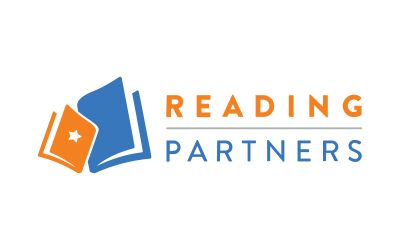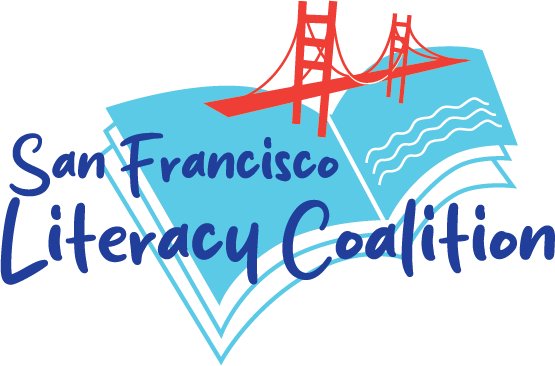
Reading Partners is one of the six organizations that partner with the San Francisco Literacy Coalition. We had the chance to talk to Maximillian Howard from Reading Partners about the powerful impact of providing individualized support to students. This comes after a period of shifts within Reading Partners, given sudden changes to Americorps funding that were announced in early May of this year. We sat down with Maximillian to learn about what collaboration has looked like this year and how he and his team plan to improve programming next year.
About Reading Partners
San Francisco Literacy Coalition (SFLC): What does Reading Partners do?
Maximillian Howard (MH): Reading Partners is a national organization that is committed to providing one-on-one literacy tutoring for elementary students who are behind grade skill level. The main mission is to give these students a chance to practice what they may have missed in past years but aren’t practicing in class, and to provide them individualized help that best fits their needs. To do this, we have lots of volunteer tutors that give their time to help the community.
SFLC: Why does foundational skills instruction matter?
MH: Foundational skills instruction is important because, contrary to lots of people’s belief, reading is a skill that needs to be learned and practiced! It’s not something that happens naturally, like speech. So if a student is missing those core skills, advancing in the future isn’t something that will just happen without support for them to practice. So many students I work with have excellent comprehension skills and enjoy reading, but they are missing those core building blocks to support them.
SFLC: What is your hope for all students who take part in Reading Partners programming?
MH: My main goals are to give students time to practice the core skills they may not have individual time for in a classroom environment, as well as to give them the opportunity for one-on-one attention and education. A big part of what makes Reading Partners special to me is the tutor and student relationship. Not only are we providing a space to learn, we’re also providing a space to build confidence and practice social skills in a safe, judgement-free environment,which is just as important to me as the literacy instruction.
Building Strong Partnerships at TCS
SFLC: What does partnership mean to you?
MH: Like with all things, teaching is stronger and more effective as a team. Being aligned with the goals of the school, teachers, and students themselves is incredibly important. Without teacher guidance and communication about individual students and their needs, I couldn’t help the students the way that works best for them. I also want to make sure that I’m supporting the school where they need it, and knowing what their priorities and literacy goals are helps so much.
SFLC: How do you partner with teachers and school staff in your work? What does collaboration look like?
MH: The biggest way Reading Partners collaborates with teachers is through direct communication. This is through formal referral surveys and reports, but also through one-on -one conversations so we can make sure I’m supporting each student with what they are struggling with, and in a way that works best for them. Reading Partners gets all of our students referred from the teachers, so they can provide us with students they think would benefit from our work most. At different points in the year I’ll send out forms that teachers fill out that tell me which students to prioritize and anything that would be helpful for me to know about that student’s needs. I can then assess them and see if they qualify for our program. Once a student is enrolled, collaboration with the teacher becomes an open line of communication for questions or updates about the student, their progress in our program, and any educational or behavioral needs they have. At the end of the year, each teacher is provided with an overall report of the student’s performance, strengths and challenges, and their progress throughout the curriculum.
I also have really enjoyed attending staff meetings, SFLC meetings, and even TCS community events so I can get a more clear picture of how Reading Partners can work best at TCS — and I’ve felt so welcomed by this great community! Each school we are working with is going to have a different expectation of their relationship to our program, so it was a priority for me to figure out what TCS’ goals were so I could provide the best support possible.
Looking Ahead
SFLC: What are you excited about when it comes to HMH, SFUSD’s chosen ELA curriculum, and Reading Partners alignment moving forward?
MH: One of the ways I think HMH and Reading Partners can collaborate best is through our Individual Reading Plans (IRPs), which are personalized skill building activities I develop for each student’s needs. While our curriculum is extensive in its variety of lessons for different age groups, each student is going to have specific things they need more practice with over others. This is a way that I can look at the school curriculum (HMH) and say, “this activity could really help this student build the skills they are learning in the classroom.” IRPs are the most flexible part of our program, which makes it perfect for aligning with the district and school’s goals.
SFLC: What are future Reading Partners initiatives you’re excited to build upon in the coming school year?
MH: I’m excited for Reading Partners’ future because we are developing more ways to provide support to more students — small groups, expanding enrollment, providing more Reading Partners staff support at our sites, etc. I know everybody in our Bay Area region is already preparing for next year!
SFLC: What has been a bright spot this year?
MH: My favorite part of Reading Partners is being able to see the direct growth of students throughout the year. Not just in reading ability, but also in social skills, excitement about learning, and, most importantly, confidence in themselves. The moments where I’ve gotten to see a student first take initiative in reading because they’re excited about it are my absolute favorite, and so much of that is due to the tutor and scholar relationship. I’ve seen firsthand how that one-on-one support has helped so many students realize they are more capable readers and learners than they thought before!
